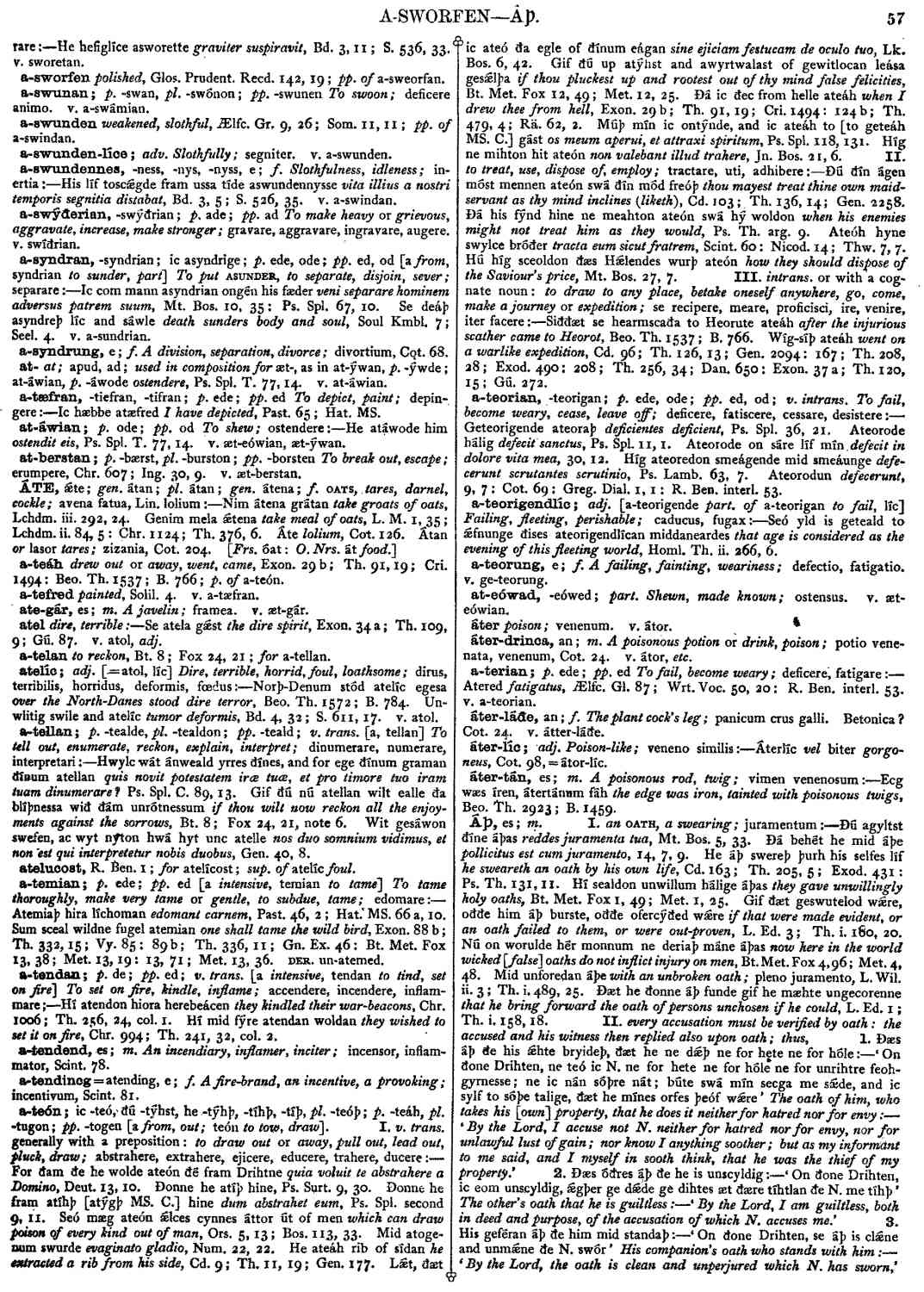ÁÞ
- noun [ masculine ]
-
Ðú agyltst ðine áþes
reddes juramenta tua,
- Mt. Bos. 5, 33 .
-
Ðá behét he mid áþe
pollicitus est cum juramento,
- 14, 7. 9 .
-
He áþ swereþ þurh his selfes líf
he sweareth an oath by his own life,
- Cd. 163; Th. 205, 5 ;
- Exod. 431 :
- Ps. Th. 131, 11 .
-
Hí sealdon unwillum hálige áþas
they gave unwillingly holy oaths,
- Bt. Met. Fox 1, 49 ;
- Met. 1, 25 .
-
Gif ðæt geswutelod wǽre, oððe him áþ burste, oððe ofercýðed wǽre
if that were made evident, or an oath failed to them, or were out proven,
- L. Ed. 3 ; Th. i. 180, 20 .
-
Nú on worulde hér monnum ne deriaþ máne áþas
now here in the world wicked [false] oaths do not inflict injury on men,
- Bt. Met. Fox 4, 96 ;
- Met. 4, 48 .
-
Mid unforedan áþe
with an unbroken oath;
pleno juramento,
- L. Wil. ii. 3 ; Th. i. 489, 25 .
-
Ðæt he ðonne áþ funde gif he mæhte ungecorenne
that he bring forward the oath of persons unchosen if he could,
- L. Ed. 1 ; Th. i. 158, 18 .
Ðæs áþ ðe his ǽhte bryideþ, ðæt he ne dǽþ ne for hete ne for hóle: - On ðone Drihten, ne teó ic N. ne for hete ne for hóle ne for unrihtre feohgynesse; ne ic nán sóþre nát; búte swá mín secga me sǽde, and ic sylf to sóþe talige, ðæt he mines orfes þeóf wǽre'
The oath of him, who takes his [own] property, that he does it neither for hatred nor for envy :-- By the Lord, I accuse not N. neither for hatred nor for envy, nor for unlawful lust of gain; nor know I anything soother; but as my informant to me said, and I myself in sooth think, that he was the thief of my property.'
-
Ðæs óðres áþ ðe he is unscyldig: - On ðone Driliten, ic eom unscyldig, ǽgþer ge dǽde ge dihtes æt ðære tíhtlan ðe N. me tíhþ'
The other's oath that he is guiltless :-- By the Lord, I am guiltless, both in deed and purpose, of the accusation of which N. accuses me.'
His geféran áþ ðe him mid standaþ: - On ðone Drihten, se áþ is clǽne and unmǽne ðe N. swór'
His companion's oath who stands with him :-- By the Lord, the oath is clean and unperjured which N. has sworn,'
- L. O. 4-6; Th. i. 180, 8-19 .
Ánfeald áþ [lád]
a simple oath [exculpation];
simplex juramentum [purgatio] hoc est, accipiat duos, et sit ipse tertius, et sic jurando conquirat simplicem purgationem.
-
Þrýfeald áþ
a threefold oath;
triplex juramentum, hoc est, accipiat quinque, et ipse sit sextus,
- L. C. S. 22 ; Th. i. 388, 11, 12, and note b .
Bosworth, Joseph. “ÁÞ.” In An Anglo-Saxon Dictionary Online, edited by Thomas Northcote Toller, Christ Sean, and Ondřej Tichy. Prague: Faculty of Arts, Charles University, 2014. https://bosworthtoller.com/2478.
Checked: 1